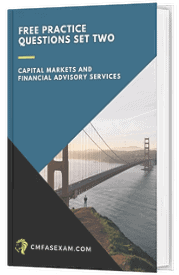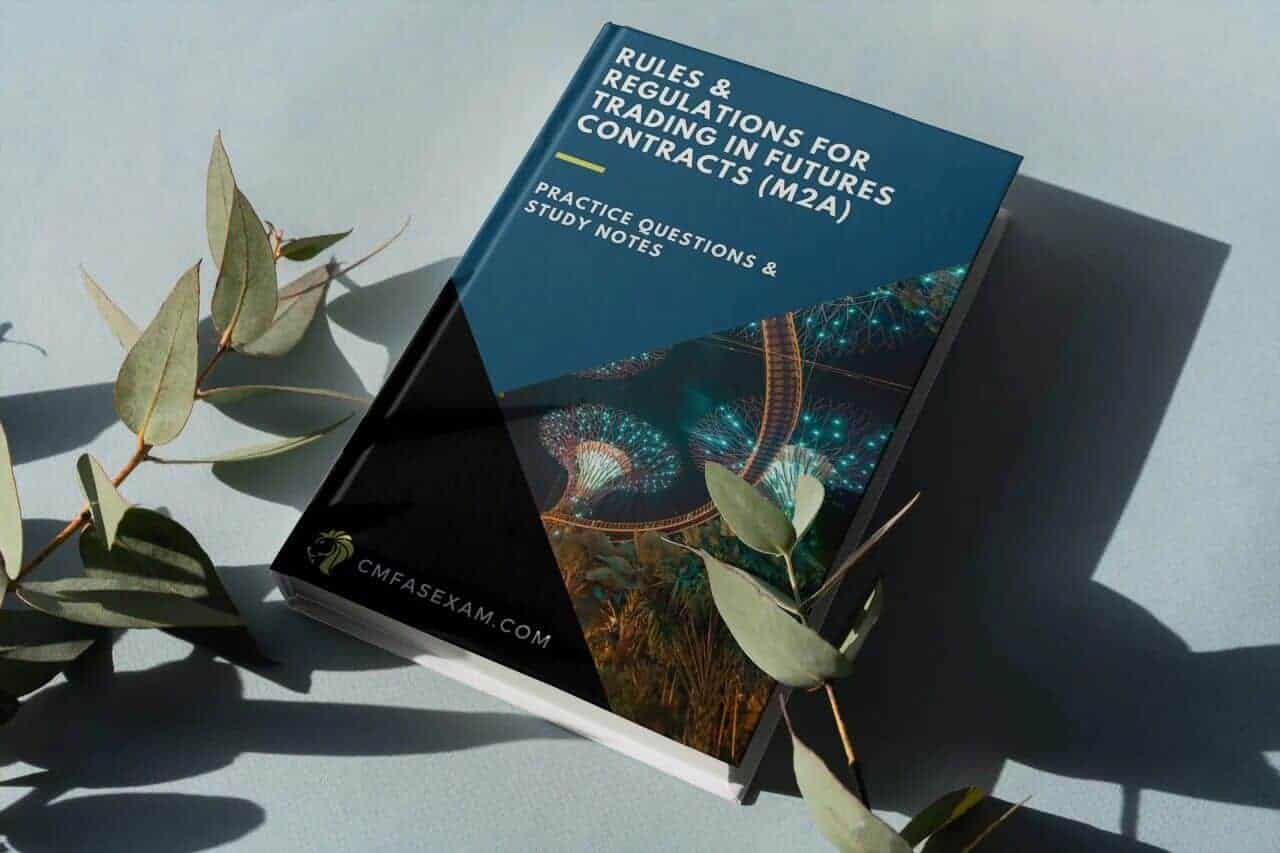CMFAS M2a Exam Free Trial
Let us do all the heavy works so that you can study efficiently.
Quiz-summary
0 of 20 questions completed
Questions:
- 1
- 2
- 3
- 4
- 5
- 6
- 7
- 8
- 9
- 10
- 11
- 12
- 13
- 14
- 15
- 16
- 17
- 18
- 19
- 20
Information
CMFAS Module M2A Free Preview
You have already completed the quiz before. Hence you can not start it again.
Quiz is loading…
You must sign in or sign up to start the quiz.
You have to finish following quiz, to start this quiz:
Results
0 of 20 questions answered correctly
Your time:
Time has elapsed
You have reached 0 of 0 points, (0)
Categories
- Not categorized 0%
-
Congratulations! You have completed the first free practice question
Enter your email below to start the next free practice questions immediately
Or
- 1
- 2
- 3
- 4
- 5
- 6
- 7
- 8
- 9
- 10
- 11
- 12
- 13
- 14
- 15
- 16
- 17
- 18
- 19
- 20
- Answered
- Review
-
Question 1 of 20
1. Question
Which of the following is of the policies and procedures for EDD?
Correct
A CMS Licensee should also put in place proper policies and procedures for EDD including but not limited to the following:
i. Implement appropriate internal policies, procedures and controls to identify and determine if a customer or beneficial owner (BO) is a PEP i.e. a PEP policy;
ii. Obtain the approval from CMI’s senior management to establish or continue business relations where the customer or beneficial owner is a PEP or subsequently a PEP; and
iii. Establish by appropriate and reasonable means the source of wealth and source of funds of any customer or BO.Incorrect
A CMS Licensee should also put in place proper policies and procedures for EDD including but not limited to the following:
i. Implement appropriate internal policies, procedures and controls to identify and determine if a customer or beneficial owner (BO) is a PEP i.e. a PEP policy;
ii. Obtain the approval from CMI’s senior management to establish or continue business relations where the customer or beneficial owner is a PEP or subsequently a PEP; and
iii. Establish by appropriate and reasonable means the source of wealth and source of funds of any customer or BO. -
Question 2 of 20
2. Question
Which of the following will breaches of security impact?
Correct
Breaches of security will impact:
Banking Secrecy provisions in the Banking Act
Personal Date Protection Act (PDPA)
Civil Action
Fines
Imprisonment Terms
ReputationIncorrect
Breaches of security will impact:
Banking Secrecy provisions in the Banking Act
Personal Date Protection Act (PDPA)
Civil Action
Fines
Imprisonment Terms
Reputation -
Question 3 of 20
3. Question
What is the penalty for breach of Section 48(1) & 48(2)?
Correct
PENALTY FOR BREACH OF SECTION 48(1) & 48(2)
a) Fine up to S$30,000 or
b) Imprisonment up to 3 years or
c) BothIncorrect
PENALTY FOR BREACH OF SECTION 48(1) & 48(2)
a) Fine up to S$30,000 or
b) Imprisonment up to 3 years or
c) Both -
Question 4 of 20
4. Question
Which of the following statements is true regarding Terrorism Act?
Correct
The TSOFA was enacted to give effect to the International Convention for the Suppression of the Financing of Terrorism which Singapore signed in 2001 and the United Nations Security Council Resolution 1373. The TSOFA criminalises terrorism financing and allows for the seizure and confiscation of property related to terrorist and terrorism purposes. It also imposes a duty on all to provide information pertaining to terrorism financing to the Police, and failure to do so is a criminal offence.
Incorrect
The TSOFA was enacted to give effect to the International Convention for the Suppression of the Financing of Terrorism which Singapore signed in 2001 and the United Nations Security Council Resolution 1373. The TSOFA criminalises terrorism financing and allows for the seizure and confiscation of property related to terrorist and terrorism purposes. It also imposes a duty on all to provide information pertaining to terrorism financing to the Police, and failure to do so is a criminal offence.
-
Question 5 of 20
5. Question
Which of the following statements is true regarding MAS Notice on Prohibition on Transactions with the Iranian Government and with Iranian Financial Institutions?
Correct
The prohibition in the MAS Notice would include a prohibition against the provision of financial services by a CMS licence holder to a person in connection with that person’s transaction or business relationship with a designated person or for the benefit of (whether directly or indirectly) a designated person. It shall however not apply to transactions or business relationships in respect of which CMS licence holder has written to the MAS for approval and where the MAS has given its written approval.
Incorrect
The prohibition in the MAS Notice would include a prohibition against the provision of financial services by a CMS licence holder to a person in connection with that person’s transaction or business relationship with a designated person or for the benefit of (whether directly or indirectly) a designated person. It shall however not apply to transactions or business relationships in respect of which CMS licence holder has written to the MAS for approval and where the MAS has given its written approval.
-
Question 6 of 20
6. Question
Which of the following statements is true regarding reference price for non-designated futures contracts?
Correct
Reference Price for non-Designated Futures Contracts
The opening price of the contract shall be the reference price. If the opening price is not available, SGX may use other prices that it thinks in its discretion are reasonable. For instance, SGX may use the previous day’s closing price.Incorrect
Reference Price for non-Designated Futures Contracts
The opening price of the contract shall be the reference price. If the opening price is not available, SGX may use other prices that it thinks in its discretion are reasonable. For instance, SGX may use the previous day’s closing price. -
Question 7 of 20
7. Question
Which of the following statements is true regarding de-listing of contracts?
Correct
If there is no interest in a given contract for an extended period of time, SGX-DT may choose to de-list the contract, removing it from the market. De-listed contracts will no longer be available for trading.
SGX-DT, at its own discretion, may decide to de-list any contract at any given time for the maintenance of a fair, orderly and transparent market.Incorrect
If there is no interest in a given contract for an extended period of time, SGX-DT may choose to de-list the contract, removing it from the market. De-listed contracts will no longer be available for trading.
SGX-DT, at its own discretion, may decide to de-list any contract at any given time for the maintenance of a fair, orderly and transparent market. -
Question 8 of 20
8. Question
Which of the following statements is true regarding Open Period?
Correct
As the Market transits into the “Open” state, an Equilibrium Price will be generated by the SGX-DT QUEST. The Equilibrium Price is the price that uncrosses the market order book, which enables the largest quantity of trades to be executed.
Thereafter, trading continues as normal, with the relevant Trade Matching Algorithms guiding the matching of orders.Incorrect
As the Market transits into the “Open” state, an Equilibrium Price will be generated by the SGX-DT QUEST. The Equilibrium Price is the price that uncrosses the market order book, which enables the largest quantity of trades to be executed.
Thereafter, trading continues as normal, with the relevant Trade Matching Algorithms guiding the matching of orders. -
Question 9 of 20
9. Question
Which of the following are of the examples of an emergency situation?
I. Unwarranted speculation in any of the markets.
II. Revocation or suspension of access to QUEST.
III. Curtailment of trading in any contract.
IV. A state of war or threatened hostilities.Correct
I & IV.
It is not possible to predict unforeseen emergencies, however examples of an emergency situation may include:
• An excessive trading position accumulated by a person or persons;
• Unwarranted speculation in any of the markets;
• A state of war or threatened hostilities;
• The introduction of, or change to, official controls affecting a market or contract, (such as the closure of the foreign market where the underlying asset is traded);
• A breakdown or failure of QUEST or any other communication, equipment or market facilities operated by the Exchange; or
• Any other undesirable situation or practice that adversely affects market integrity or investor rights.Incorrect
I & IV.
It is not possible to predict unforeseen emergencies, however examples of an emergency situation may include:
• An excessive trading position accumulated by a person or persons;
• Unwarranted speculation in any of the markets;
• A state of war or threatened hostilities;
• The introduction of, or change to, official controls affecting a market or contract, (such as the closure of the foreign market where the underlying asset is traded);
• A breakdown or failure of QUEST or any other communication, equipment or market facilities operated by the Exchange; or
• Any other undesirable situation or practice that adversely affects market integrity or investor rights. -
Question 10 of 20
10. Question
Which of the following statements are true regarding terrorist financing?
I. Terrorist Financing is similar to money laundering.
II. Terrorist Financing can be defined by some as the reverse of money laundering as clean money is sometimes used to finance criminal and terrorist acts.
III. Terrorist acts usually have its roots in political beliefs or ideology and are used to threaten and influence government policies and go against the rule of law.
IV. Terrorist Financing is a process intended to mask the proceeds obtained from criminal activities such as drug trafficking and other serious crimes so that they appear to have come from a legitimate source.Correct
II & III.
Terrorist Financing can be defined by some as the reverse of money laundering as clean money is sometimes used to finance criminal and terrorist acts. Such acts usually have its roots in political beliefs or ideology and are used to threaten and influence government policies and go against the rule of law.Incorrect
II & III.
Terrorist Financing can be defined by some as the reverse of money laundering as clean money is sometimes used to finance criminal and terrorist acts. Such acts usually have its roots in political beliefs or ideology and are used to threaten and influence government policies and go against the rule of law. -
Question 11 of 20
11. Question
Which of the following statements is true regarding price priority?
Correct
All orders entered into QUEST will be matched with the best price given priority i.e. orders at the highest bid and lowest offer are matched first over other orders in the same contract month/spreads.
Incorrect
All orders entered into QUEST will be matched with the best price given priority i.e. orders at the highest bid and lowest offer are matched first over other orders in the same contract month/spreads.
-
Question 12 of 20
12. Question
Which of the following statements is true regarding day order?
Correct
Day Order: It should be noted that whilst the name of the validity is “Day”, the order is only valid in the same trading session. As such, an order entered on the 29th March during the T-session will be automatically deleted by QUEST at the end of the T-Session. The order will not be valid or active during the T+1 Session of 29th March. This validity is appropriate for orders that are only to be executed during the particular trading session.
Incorrect
Day Order: It should be noted that whilst the name of the validity is “Day”, the order is only valid in the same trading session. As such, an order entered on the 29th March during the T-session will be automatically deleted by QUEST at the end of the T-Session. The order will not be valid or active during the T+1 Session of 29th March. This validity is appropriate for orders that are only to be executed during the particular trading session.
-
Question 13 of 20
13. Question
Which of the following statements is true regarding Limit Order?
Correct
Validities allowed: Day, GTC, FOK, FAK
Limit Orders allow traders to specify the exact price they wish to get matched at. A Limit Order specifies the maximum price that a buyer is willing to pay, or the minimum price a seller is willing to receive for one contract. Limit orders will also specify a quantity for the order.
Incorrect
Validities allowed: Day, GTC, FOK, FAK
Limit Orders allow traders to specify the exact price they wish to get matched at. A Limit Order specifies the maximum price that a buyer is willing to pay, or the minimum price a seller is willing to receive for one contract. Limit orders will also specify a quantity for the order.
-
Question 14 of 20
14. Question
Which of the following statements are true regarding Session State Order?
I. SSOs trigger the entry of an order into the order book when the market transitions into a new session state.
II. A SSO is an order to buy (or sell) a contract below (or above) the market.
III. A SSO will enable the trader to enter his sell order now, and have it retained by QUEST till the Pre-Close Auction.
IV. A SSO Order is similar, from a technical perspective, to a Stop Order in that they both have trigger prices, but their application is different.Correct
I & III.
SSOs trigger the entry of an order into the order book when the market transitions into a new session state. Market participants can query for the list of valid session states and select the appropriate session state. SSO’s are typically used to execute trades during the Pre-Open Auction (Market-on-Open), or the Pre-Close Auction (Market-on-Close). This allows the trader to enter his order any time before the desired session state, rather than having to wait till this market transits to that session state.Incorrect
I & III.
SSOs trigger the entry of an order into the order book when the market transitions into a new session state. Market participants can query for the list of valid session states and select the appropriate session state. SSO’s are typically used to execute trades during the Pre-Open Auction (Market-on-Open), or the Pre-Close Auction (Market-on-Close). This allows the trader to enter his order any time before the desired session state, rather than having to wait till this market transits to that session state. -
Question 15 of 20
15. Question
Which of the following are of the modes via which NLTs can be registered?
I. “T-Session” trades.
II. The eNLT system.
III. Reporting Cut-off Time.
IV. The Trade Report Application Programming Interface functionality.Correct
II & IV.
All NLTs must be reported to the Exchange.
NLTs can be registered via one of the following modes of registration:
– The eNLT system (Electronic Negotiated Large Trade — a web-based system);
– The Trade Report Application Programming Interface functionality; or
– The Trade Registration System and any enhancements, updates and variations to such system from time to time. NLT’s can be registered by the counterparties or their Clearing Members and their affiliates, on their behalf. Prior approval must first be obtained from the Clearing Members of both the buyer and the seller, before the NLT is submitted for registration by the counterparties.Incorrect
II & IV.
All NLTs must be reported to the Exchange.
NLTs can be registered via one of the following modes of registration:
– The eNLT system (Electronic Negotiated Large Trade — a web-based system);
– The Trade Report Application Programming Interface functionality; or
– The Trade Registration System and any enhancements, updates and variations to such system from time to time. NLT’s can be registered by the counterparties or their Clearing Members and their affiliates, on their behalf. Prior approval must first be obtained from the Clearing Members of both the buyer and the seller, before the NLT is submitted for registration by the counterparties. -
Question 16 of 20
16. Question
Which rule prohibits a Trading Member or a Trading Representative from dealing in securities in a manner that will or may affect or maintain the price of the securities?
Correct
SGX-ST Rule 13.8.5 prohibits a Trading Member or a Trading Representative from dealing in securities in a manner that will or may affect or maintain the price of the securities, where the intent is to induce other persons to subscribe for, buy or sell the securities is deemed market manipulation and is prohibited. However, this rule does not apply to stabilising action carried out in accordance with Regulation 3 of the Securities and Futures (Market Conduct)(Exemption) Regulations.
Incorrect
SGX-ST Rule 13.8.5 prohibits a Trading Member or a Trading Representative from dealing in securities in a manner that will or may affect or maintain the price of the securities, where the intent is to induce other persons to subscribe for, buy or sell the securities is deemed market manipulation and is prohibited. However, this rule does not apply to stabilising action carried out in accordance with Regulation 3 of the Securities and Futures (Market Conduct)(Exemption) Regulations.
-
Question 17 of 20
17. Question
Which of the following is a way of inducing another person to deal in securities?
Correct
Under SFA Section 200(1), it is an offence to induce or attempt to induce another person to deal in securities by:
1. Making or publishing any statement, promise or forecast that he knows or ought reasonably to have known to be misleading, false or deceptive;
2. Any dishonest concealment of material facts;
3. Reckless making or publishing of any statement, promise or forecast that is misleading, false or deceptive; or
4. Recording or storing in, or by means of, any mechanical, electronic or other device.Incorrect
Under SFA Section 200(1), it is an offence to induce or attempt to induce another person to deal in securities by:
1. Making or publishing any statement, promise or forecast that he knows or ought reasonably to have known to be misleading, false or deceptive;
2. Any dishonest concealment of material facts;
3. Reckless making or publishing of any statement, promise or forecast that is misleading, false or deceptive; or
4. Recording or storing in, or by means of, any mechanical, electronic or other device. -
Question 18 of 20
18. Question
What is the penalty for disclosure of orders according to SFR(LCB)?
Correct
SFR(LCB)
Offences are punishable with a fine not exceeding $50,000.Incorrect
SFR(LCB)
Offences are punishable with a fine not exceeding $50,000. -
Question 19 of 20
19. Question
Which of the following statements is true regarding maintenance margin?
Correct
For open positions, Members will refer to the maintenance margin requirements for the contract.
Maintenance margin is the minimum required level of margin the customer must maintain in his account at all times in order to support the trade, and it is usually lower than initial margin. When a customer’s total net equity falls below the maintenance margin requirements, a margin call is issued by the Member to the customer.Incorrect
For open positions, Members will refer to the maintenance margin requirements for the contract.
Maintenance margin is the minimum required level of margin the customer must maintain in his account at all times in order to support the trade, and it is usually lower than initial margin. When a customer’s total net equity falls below the maintenance margin requirements, a margin call is issued by the Member to the customer. -
Question 20 of 20
20. Question
In which case is a member allowed to grant the customer a margin credit?
Correct
In cases where a customer holds long and short positions in the same contract, but on different exchanges, a Member is allowed to grant the customer a margin credit, therefore reducing the customer’s total amount of margin requirement.
Incorrect
In cases where a customer holds long and short positions in the same contract, but on different exchanges, a Member is allowed to grant the customer a margin credit, therefore reducing the customer’s total amount of margin requirement.
Learn how you can reduce CMFAS Exam study time by 53% and achieve success completely for free
- Start Free practice questions set two
- Mistakes people make when preparing exam and how to avoid it
- When to know if you are ready for to take the exam
- How this one little trick can increase your pass rate by another 10% instantly
- How to remember what you studied without stressing yourself
- Why people with 20 years of working experience and a CFA, FRM holder failed the CMFAS exam
Why CMFASExam
Enormous Exam Bank
Large number of questions to help you memorize all possible exam content
Explanation Provided
Get detailed explanation right after each questions
Support All Devices
Support all tablets and handheld. Study anywhere
Until You Pass Guarantee
We are very confident with our product. Therefore all purchase comes with a success guarantee
Bonus Tips
Get the bonus article of: 17 Secret Tips To Improve CMFAS Study by 39%
Adhere to CMFAS Examination Format
All questions are adhered to the real examination format to simulate the real exam environment
Frequently Updated
Our exam bank is frequently updated by our examination team
Carefully Crafted
Each questions is carefully crafted by our exam specialist and adhere to the real question formats
Instant Access
No delivery time and fee is needed. Access immediately after payment




